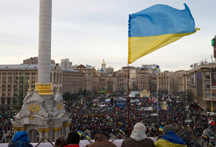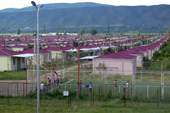Illusion and reality
By Messenger Staff
Tuesday, April 1






Where to stay, where to go, and with whom? One formula is clear: Georgia is not a separate island in the ocean. As a small nation, it has to be a close ally with some larger force(s), and it has been so historically.
During Georgia’s several thousand years of history, the country has had to do a balancing act in a hostile world in order to maintain its statehood, national identity, culture and religion.
Different empires around Georgia have tried to snatch its territories and subordinate the country at different times. Romans, Byzantines, Ottomans, Persians and eventually the Russians have been domineering forces throughout Georgia’s history.
After regaining its independence for the second time in the 20th century, Georgia changed its orientation towards Europe and Euro-Atlantic structures headed by the US.
As defined by Georgia’s leadership since regaining independence, Russia is Georgia’s major threat today. It can also be said that Bolshevism, which was a collective product of different nations including Russia, Georgia and other Soviet nations, was also a major threat.
In fact it was Stalin, who happened to be ethnically Georgian, who ruled the Soviet Union for more then 30 years and created the largest and the strongest Bolshevik empire.
Georgia eventually took on a western orientation and blamed Russia for all of its problems. Accordingly, Russia became enemy number one and pushed Georgia to seek the shelter of other regional powers from the European Union and the US. Tbilisi applied to NATO to secure its independence from the threat coming from the north.
However, the West put its major interests towards the Baltic countries, and as soon as they became independent, NATO and the European Union made a political decision for the three Baltic countries (Lithuania, Latvia and Estonia) to join the EU and NATO, thus securing their future, and protecting them from the Russian threat.
Unfortunately, both NATO and the EU have applied stricter standards towards Georgia. Since expressing its wish to join these organizations, Georgia is trying hard to comply with the requirements they put in front of the country.
However, during this period Russia occupied 20% of the country’s territories, and organized the quasi-independent states of Abkhazia and South Ossetia, thus creating a dramatic obstacle for Georgia to join NATO.
Incorporating a state with territorial disputes is against the NATO charter. To overcome these obstacles, either Georgia has to give-up its territories and attempt to enter NATO without them or NATO has to change its charter.
At first glance, it is unlikely that any of these conditions can be fulfilled. Yet Georgia has participated in NATO peacekeeping operations in Kosovo, Iraq, Afghanistan and now in the Central African Republic, and has improved its democratic development by creating a civil society, and by perfecting its election performance.
Georgia most recently became eligible to join the EU as an associate member, which is not the exact membership, but better than nothing. As for NATO, the position of some of its members has caused frustration, disappointment and irritation within the Georgian population.
A sense of helplessness is increasing within the country, and this is opening the doors to the idea of a return to the Russian sphere.
According to the popular understanding of the world, neither the EU nor NATO could tame the Russian bear. The recent developments in Crimea have proved this formula. The world cannot apply the necessary measures to force Russia to give up its imperialistic claims. The Russian appetite is growing. There are voices both inside and outside Russia about continuing “support” of the Russian population in different countries around Russia – in Moldova in particular– and in the Eastern part of Ukraine, and probably in Georgia as well.
The first steps have been taken by Moscow. Russian passports are being distributed to the Abkhazian and South Ossetian population, as well as in Moldova and the eastern parts of Ukraine.
This method has been tested before in different places and its works. Meanwhile, European countries cannot unite in the sanctions to be taken against the Russian aggressors. Many European countries, in particular, the Eastern Europeans, depend on Russian natural gas supply so deeply that they cannot afford to cut-off this source of energy. Therefore, Moscow is operating with impunity.
Georgians remember that in 2008 when NATO refused to grant it the membership action plan (MAP) the Kremlin launched a military attack against Georgia. There is concern that this could be repeated again.
Although many political figures and analysts reject this possibility, Russia is unpredictable. It has the momentum to start rebuilding the empire not in the same way as the Soviet Union was, but something similar. Nobody in the world seems to be able (or willing) to oppose its moves.
Georgia is at a crossroads. It must take crucial steps, but it needs assistance from the West, otherwise, it might take the wrong steps.
